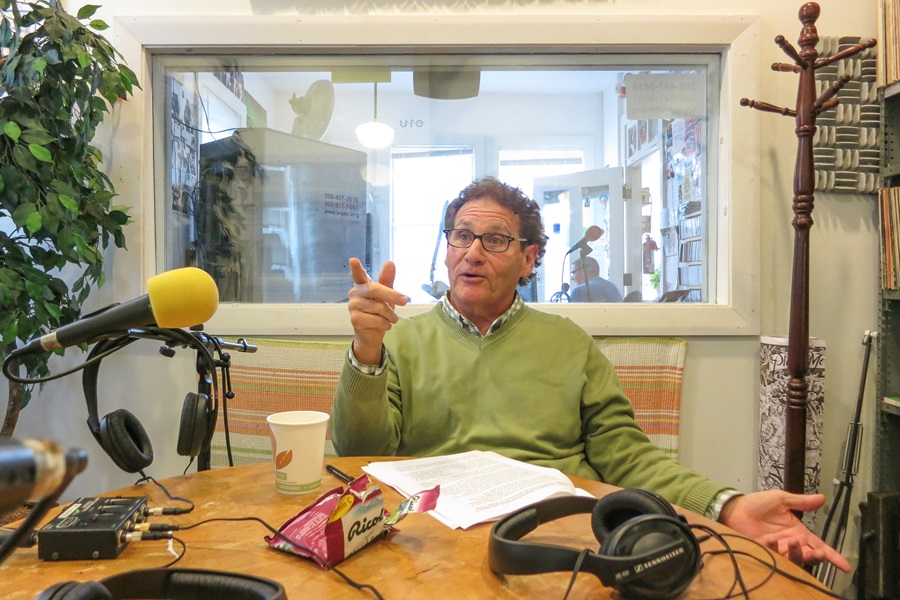There are four rules that underpin a good interview, says Ira Wood, host and producer of The Lowdown on WOMR. Maybe the most important one, he says, is this: lavish the person you’re interviewing with attention.
Wood says that it was his wife, the writer Marge Piercy, who gave him that insight. She told him, “Attention is love,” says Wood. “And in a strange way, an interview is like a very, very brief love affair.”
His on-air interviews — with thinkers, activists, and eccentrics of all kinds and lately nearly always writers — have included everyone from Indian-American physician, biologist, and author Siddhartha Mukherjee, whose most recent book, The Song of the Cell, won the Chautauqua Prize in 2023, to Heather Radke, who wrote a carefully researched cultural history of women’s rear ends called Butts: A Backstory.

His other rules are to do your research (and for him that means reading the whole book); make a genuine connection with your guest; and be curious — no matter the subject of the interview.
Interviewing is not something Wood ever studied. “I’ve never read a book about it,” he says. Every interviewer develops his own method, he adds.
Wood admires Terry Gross — “She’s the best interviewer,” he says. But unlike her interviews on NPR, which get edited down for efficiency and clarity, Wood’s episodes are recorded live on tape. “What you hear is what you get,” he says. “Unless somebody has an enormous coughing fit, I will not stop the tape.”
Wood has learned to improvise. “I’ll come with a whole list of questions,” he says. “But sometimes I’ll ask question number one, and they’ll give me the answer to question number 10. Then it’s like, ‘What the heck do I do now?’ ” The rule doesn’t earn a spot among Wood’s four tenets of interviewing, but he mentions it anyway: “Be as prepared as you can, but then be ready for shit to hit the fan.”
Wood moved from Cambridge to Wellfleet 50 years ago to be with Piercy. “I was writing novels at the time,” he says. Cape Cod was an inspiring place to write, but the writing life was a lonely one. “The only thing I don’t like about writing,” says Wood, “is sitting alone and writing.”
Eventually he made his way onto the town’s zoning board of appeals, where he met people involved in town affairs, and “My world opened up.” He published a first novel, The Kitchen Man, and traveled around the country doing readings. Then, with Piercy, he started Leapfrog Press in 1997, but after selling it in 2007 found himself looking for something new to do.
“Somebody asked me if I wouldn’t like to do a show on town politics,” he says. His first show was called Outer Cape Debate. Wood seems to relish the memory of featuring the hot topics of the day: “There was a huge controversy about wind turbines. People were calling in and giving their opinions.”
But after about three weeks, Wood realized that not everyone he wanted to interview was going to travel up to Provincetown to talk with him. So, he switched gears: he started developing relationships with publicists at publishing companies. He reads a book every week and interviews authors of all kinds from all over the world: scientists, musicologists, sociologists, historians.
An interview isn’t just a conversation, says Wood: “It’s a very directed conversation.” In the 30 minutes he’s allotted for each show — “The gist of almost anything can be explained in 30 minutes” — he works to prevent the talk from going “all over the place.”
“Though I do allow people to hang themselves,” he says. But that doesn’t happen often, he adds. In fact, it’s mainly Wood who utters a controversial word every now and again — “There are certain words you can get away with,” he says.
Worse than a wandering conversation, he says, would be a boring one. But if that were to happen, it would be all his fault. On his own website, Wood writes, “There are no uninteresting guests or subjects, only unprepared and self-indulgent interviewers.”
As for questions, Wood writes his out. Sometimes a guest needs constant prodding. Then there are those who won’t stop talking. “I have become a total expert in listening to when people are taking a breath,” he says. When there’s a gap in their speech, he’ll insert the next question.
“The hardest question to come up with is the first question,” says Wood. “I put a lot of thought into those.” When he’s interviewing someone about a book, he’ll annotate the book in colored Sharpie, crossing things out, underlining, and making notes in the margins. The first question usually goes right to the main point of the guest’s work. If a lot of “throat-clearing” follows, “in other words, a lot of talk before they get to the meat of their answer,” Wood isn’t afraid to interrupt. From there he’ll work from question to question, trying in one half-hour to get the world to understand his guest’s story.
Wood is an egotist, he says, just like everyone else. “Sometimes I’ll interject something about myself,” he admits. But he tries to keep in mind a simple truth: “It’s not about me.”
A good interview resounds with that rule. Sometimes, says Wood, at the end of an episode, a guest, so in love with the intimacy of half an hour of undivided attention, won’t want to leave the studio. In those cases, says Wood, the station’s operations manager, Matty Dunn, will come in and rescue him.
When an author is in his studio or on the telephone with him, Wood is completely committed to that person. But once the interview is over, Wood says, it’s as if his guest is gone forever. He’s not the only interviewer this happens to. “An old friend who had a show on NPR many years ago told me that when he ends an interview, the thing disappears,” he says. “It doesn’t exist. He said, ‘They’re just a fart on the wind.’
“If you ask me next week who I interviewed today, I really won’t remember,” says Wood. “It’s like, I gave it everything that I had. And then I’m on to the next.”



